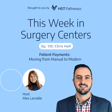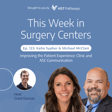
Monica Daniel – Choosing the Best Option: Opening an ASC, OBL, or Hybrid-Facility
Monica Daniel is the Principal & Founder of Axiom Integrated Services and has been consulting and helping ASCs for over 25 years. Over the last few years, Monica has seen an increase in interest and the development of OBLs (office-based labs) and that’s what we’re diving into today. We’re covering the differences between an ASC, an OBL, and a hybrid facility, the key factors to consider when choosing the most suitable option for you, how reimbursement differs, and other OBL trends Monica is seeing.
After my conversation with Monica, we’ll switch to our Data & Insights segment. Today, we’ll break down the average number of days it takes ASCs to bill, which is defined as the number of days between the date of service and the date the claim was made. And I’ll share some tips to help you close the gap and reduce your turnaround time.
We are just a few weeks from #ASCA2024 in Orlando! HST has so many fun things planned for the show, so we hope to see you all there. When you swing by our booth (next to ASCA’s at Booth #709), you can take a quiz to win a prize and give all our products a test drive. We also have two sessions for you to add to your agenda:
- Thursday, April 18th: Unleash the Power of Data to Transform Your ASC
- Friday, April 19th: How to Prepare for and Navigate Board-Level Conversations
Learn more & schedule time with HST! https://www.hstpathways.com/asca
Resources Mentioned:
- Download HST’s State of the Industry Report to get your hands on even more data: https://www.hstpathways.com/resources/surgery-center-industry-report
Brought to you by HST Pathways.



















